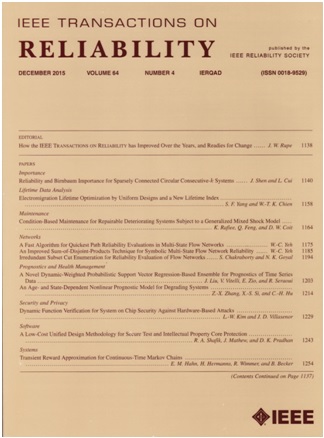A Novel Two-Stage Algorithm for Assessing System Reliability of a Multistate Sustainable Supply Chain
IF 5.7
2区 计算机科学
Q1 COMPUTER SCIENCE, HARDWARE & ARCHITECTURE
引用次数: 0
Abstract
With the adoption of the United Nations’ Sustainable Development Goals, the focus on improving supply chain sustainability and proper order distribution has become a critical problem. This study proposes a novel two-stage algorithm that involves supplier sustainability to assess the system reliability of a supply chain. System reliability, which gauges the probability of the supply chain successfully delivering a designated amount of goods to the market while considering supplier sustainability and production capacity, is an essential performance indicator used to evaluate supply chain capability and allocate orders. We establish a multistate sustainable supply chain network, where each node symbolizes a market, assembler, warehouse, or supplier, and each connecting edge signifies a carrier. The proposed two-stage algorithm first integrates a Z-number-based indifference threshold-based attribute ratio analysis (called Z-ITARA) and the reference ideal method (called Z-RIM) to assess supplier and order allocation sustainability. Afterward, sensitivity analysis is adopted to assign the flow pattern, and the changes in system reliability are observed. To demonstrate the effectiveness of the proposed algorithm, a real case of an audio corporation between China and Taiwan is studied.多状态可持续供应链系统可靠性评估的两阶段算法
随着联合国可持续发展目标的通过,注重提高供应链的可持续性和合理的订单分配已成为一个关键问题。本文提出一种涉及供应商可持续性的新型两阶段算法来评估供应链系统的可靠性。系统可靠性是衡量供应链在考虑供应商可持续性和生产能力的情况下成功向市场交付指定数量货物的概率,是评估供应链能力和分配订单的重要绩效指标。我们建立了一个多状态可持续供应链网络,其中每个节点代表一个市场、装配商、仓库或供应商,每个连接边代表一个载体。提出的两阶段算法首先集成了基于z数的无差异阈值的属性比率分析(称为Z-ITARA)和参考理想方法(称为Z-RIM)来评估供应商和订单分配的可持续性。然后采用敏感性分析方法对流型进行分配,观察系统可靠性的变化。为了验证该算法的有效性,本文以中国与台湾某音频公司为例进行了研究。
本文章由计算机程序翻译,如有差异,请以英文原文为准。
求助全文
约1分钟内获得全文
求助全文
来源期刊

IEEE Transactions on Reliability
工程技术-工程:电子与电气
CiteScore
12.20
自引率
8.50%
发文量
153
审稿时长
7.5 months
期刊介绍:
IEEE Transactions on Reliability is a refereed journal for the reliability and allied disciplines including, but not limited to, maintainability, physics of failure, life testing, prognostics, design and manufacture for reliability, reliability for systems of systems, network availability, mission success, warranty, safety, and various measures of effectiveness. Topics eligible for publication range from hardware to software, from materials to systems, from consumer and industrial devices to manufacturing plants, from individual items to networks, from techniques for making things better to ways of predicting and measuring behavior in the field. As an engineering subject that supports new and existing technologies, we constantly expand into new areas of the assurance sciences.
 求助内容:
求助内容: 应助结果提醒方式:
应助结果提醒方式:


